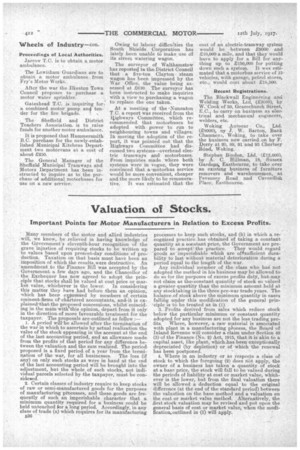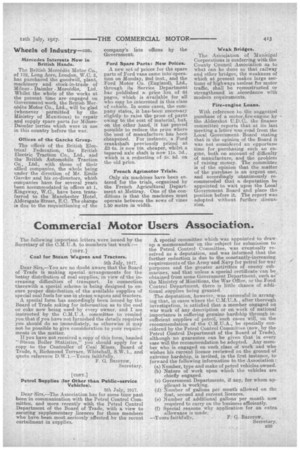Valuation of Stocks.
Page 8

Page 9

If you've noticed an error in this article please click here to report it so we can fix it.
Important Points for Motor Manufacturers in Relation to Excess Profits.
Many members of the motor and allied industries will, we know, be relieved in having knowledge of the Government's eleventh-hour recognition of the grave injustice of requiring stocks to be written up to values based upon present-day conditions of production. Taxation on that basis must have been an imposition of which the results,were destructive. An "amendment_to the Finance Bill was accepted by the Government a few days ago, and the Chancellor of the Exchequer has now agreed to adopt the principle that stocks shall be valued at cost price or market value, whichever is the lower. In considering this matter they have had before them an opinion, which has been elcpressed by members of certain eminent. firms of' chartered accountants, and-it is explained-thatthe proposed concessions, whilst coinciding in the main-with this opinion, depart from it only in the direction-of more favourable treatment for the taxpayer. The proposals are outlined as follow :—
1. A period willise allowed after the termination of the war in which to ascertain by actual realization the value of the stock appearing in the account at the end_ of the last accounting period, and an allowance made from the profits of that period for any difference between the valuation and the sum realized. The period proposed is a fixed period of a year from the termination of the war, for all businesses. The loss (if any) on only such stocks as were in hand at the end . of the last accounting period will be brought into the adjustment, but the whole. of such stocks, not individual parcels selected by the taxpayer, must be considesed.
2. Certain classes of industry require to keep stocks of raw or semi-manufactured goods for the purposes of manufacturing pitcesses, and these. goods are frequently of such an imperishable character that a minimum quantity required for a business could be held untouched ior a long period. Accordingly, in any class of trade (a) which requires for its manufacturing B36
processes to keep such stocks, and (b) in which a recognized practice. has obtained of taking a constant quantity at a constant price, the Government are prepared to accept' the practice. They would regard -goods as imperishable which are offsufficient durability to last without material deterioration during a period equal to the length of the war.
Any individual member of the class who has not adopted the method in his business may be allowed to do so for the purposes of excess profits duty, but-may not claim as theTconstant quantity of stock so valued a greater quantity than the minimum amount held at any stocktaking in the three pre-war trade years. The balance-of stock above the minimum quantity in cases falling under this modification of the general principle is to be treated as in (1).
3. Profits derived from sales which reduce stock below the particular minimum or constant quantity adopted for any business are not the less trading profits. Where, however, a raw material is associated with plant in a manufacturing pi.ocess, the Board of Inland Revenue will consider a claim under Section 40 (3) of the Finance (No. 2) Act, 1915, that it is akin to a capital asset, like plant, whichhas been exceptionally. depreciated (by depletion) or of Which the renewal has been postponed.
4. Where in an industry or as respects a class of stock to which the foregoing (2) does not apply, the owner of a business has taken a quantity of stock at a base price, the stock will fall to be valued during the periods of liability at cost or market value, Whichever is the lower, but from the final valuation there will be allowed a deduction equal to the original difference (at the end of the standard period) between the valuation on the base method and a valuation on the cost or market value method. Alternatively, the „first stock valuation may be revised and put upon the general basis of cost or market value, when the modification.outlined in (1) will apply. Mercedes Interests Now in British Hands.
The British Mercedes Motor Co., of 132, Long Acre, London, W. C. 2, has purchased the goodwill, plant, machinery and stock-in-trade of MiInes Daimler Mercedes, Ltd. Whilst the whole of the works at the present time are engaged on Government work, the British Mercedes Motor Co., Ltd., will be glad (whenever permitted by the Ministry of Munitions) to repair and supply spare parts for MikesDaimler lorries which were in use in this country before the war.
Offices of the Garcke Group.
The offices of the British Electrical Federation, the British Electric Traction Co., Ltd., and the British Automobile Traction Co., Ltd., with those of their allied companies, the whole being under the direction of Mr. Emile Garcke and his co-directors, which companies have for several years been accommodated in offices at 1, Kingsway, W.C., have been transferred to the Manchester Hotel, Aldersgate Street, E.C. The change is due to the requisitioning of the company's late offices by the Government.
Ford Spare Parts: New Prices.
A new set of prices for the spare parts of Ford vans came into operation on Monday, 2nd inst., and the Ford Motor Co. (England), Ltd., through its Service Department has published a price list of 64 pages, which is available for all who may be interested in this class of vehicle.. In. some cases, the company states, It has,been necessary slightly to raise the price of parts owing to the cost of material, but, on the other hand, it has proved possible to reduce the price where the 'cost of manufacture has been cheapened. For instance, a Ford crankshaft previously priced at £3 Cs. is now 10s. cheaper, whilst a tapered axle shaft is now us. 3d., which is a reduction of 5s. 9d. on.
the old price. • French Agrimotor Trials.
Only six machines have been entered for the trials, organized by the French Agricultural Department at Mettray. One of the conditions is that the machines must operate between the rows of vines 1.50 metre in width. Weak Bridges.
-The Association of Municipal Corporations is conferring with the County Council Association as to what can be done so that railway and other bridges, the weakness of which at present makes large sections of highways useless for motor traffic, shall be reconstructed or strengthened in accordance with modern requirements.
Fire-engine Loans.
• With reference to the suggested purchase of a motor,fire-engine by the Aldershot U.D.C., the finance committee reports that at its last meeting a letter was read from the Local Government Board stating that in the opinion of the Board it was not considered an opportune time for purchasing such an engine, both on account of difficulty of manufacture, and the problem of raising money. The committee is of the opinion that the matter of the purchase is an urgent one, and accordingly unanimously recommended that a deputation be appointed to wait upon the Local Government Board and place the position before it. The report was adopted without further discussion.






















